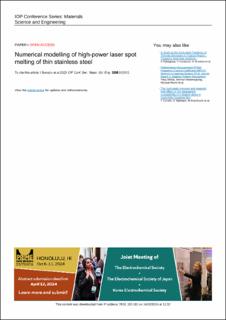Numerical modelling of high-power laser spot melting of thin stainless steel
Bunaziv, Ivan; Danielsen, Morten Høgseth; Eriksson, Magnus Carl Fredrik; Ma, Xiang; Ren, Xiaobo; Godinez Brizuela, Omar Emmanuel; Skjetne, Paal
Peer reviewed, Journal article
Published version
Date
2023Metadata
Show full item recordCollections
- Publikasjoner fra CRIStin - SINTEF AS [5801]
- SINTEF Industri [1565]
Original version
IOP Conference Series: Materials Science and Engineering. 2023, 1296: 012012. 10.1088/1757-899X/1296/1/012012Abstract
Numerical modelling is an important scientific tool in laser materials processing to study different melting, evaporation, and solidification phenomena. It can assist in understanding why certain defects are formed, and thus may provide solution paths for how to decrease certain defects and to increase the quality of a product. Laser spot melting in heat conduction mode represents a simple case and is an excellent first step to build and test solvers prior to moving on to more complicated cases such as laser keyhole welding of thick plates. Modelling of laser spot melting requires only a limited computational domain and allows more complex physics to be added gradually. In this work, a thin 3.0 mm thick stainless steel plate was melted with high-power fiber laser and numerically simulated using a native and custom-build solver based on the VOF method within OpenFOAM. The process was captured with a high-speed imaging camera and simulation results are compared with the experimental results. It was found that temperature-dependent surface tension plays a vital role in controlling melt flow directions within melt pool.

